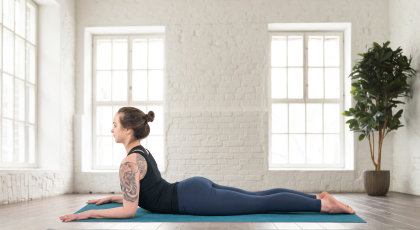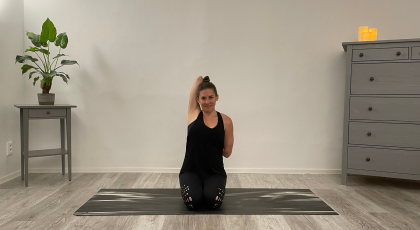View basket (0 items $0.00)

Karen O’Donnel Clarke: Bringing Freedom through Yoga for MS
Yoga instructor Karen O’Donnel Clarke works to help patients with various limiting conditions cope with their bodies’ challenges and find freedom within the boundaries. However, Clarke’s mission is not just altruistic—it is extremely personal as well. Karen O’Donnel Clarke, like many of her yoga students, suffers from Multiple Sclerosis.
Clarke, who has practiced yoga since age 13, was diagnosed with Multiple Sclerosis in 1997—just one year after becoming a certified yoga instructor. When the doctors delivered the news, Clarke experienced a shift in her world-view that propelled her into the field of adaptive yoga—a form of the practice that focuses on making yoga accessible to those who need healing the most.
Every physiology is different and comes with its own unique set of talents and limitations. For those living with Multiple Sclerosis, managing those limitations can be an extra challenge; however, yoga for MS provides patients with a doorway into a world of greater comfort and physical function.
Many patients who attend Multiple Sclerosis yoga classes find that the practice not only helps to improve balance, but can provide relief from pain and fatigue as well. For those suffering from the chronic neurological disease, the improved physiological function that yoga for MS can provide is invaluable.
Unlike other forms of exercise, which can cause the body to overheat and thus trigger symptoms, adaptive MS yoga offers patients a way to work with their bodies in a slow and yet focused manner.
Clarke, alongside other Multiple Sclerosis yoga teachers, emphasizes the importance of tailoring yoga poses to each student’s personal needs. Classes that offer yoga for those with Multiple Sclerosis may, for example, bring on-the-floor poses into chairs or use other props. But regardless of how the poses are adapted, the mission remains the same: to give patients living with MS the opportunity to experience the healing effects that yoga therapy provides.
“The practice of yoga changes us,” Clarke explains. “When we focus on our breath, we become aware of our breathing patterns and tensions held in the body. As we move and stretch our bodies, tensions release and we feel better.”
And, as Clark relates, this principle doesn’t just apply to our bodies alone: the increased ease and fluidity yoga provides seeps into all aspects of our life, giving us greater grace and awareness in our day-to-day interactions, habits, and relationships.
Through yoga for MS, patients can not only gain a greater degree of physical well-being, but enjoy benefits on the level of the mind, emotions, and spirit as well.
Featured Courses








